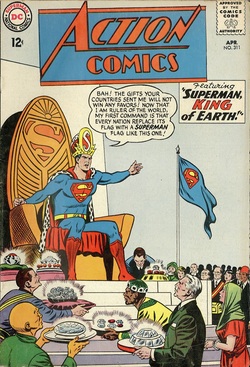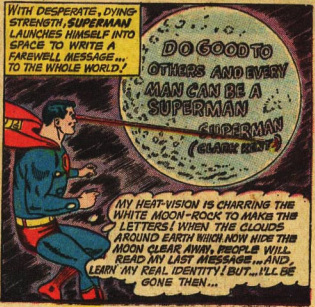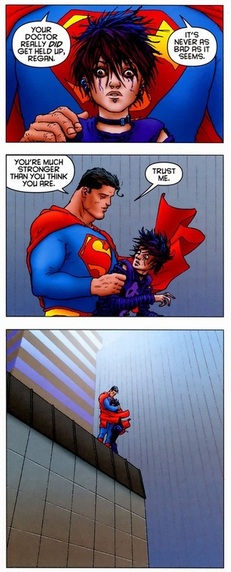 Click for source
Click for source When someone says ‘superman’, chances are that 99% of people will immediately think of a man in a cape flying through the sky. Superman is one of the most immediately recognisable figures on the planet, and it says a great deal about the talent of those who have written and drawn him over the years that he's remained so iconic.
But, as is the case with many of the most successful comic book superheroes, the real reason for his status is not his powers, but the psychology behind the character and what he represents. Essentially, he’s the personification of altruism, inspiring humanity to be the best that we can be. But it's remarkable that this is what we think of when we hear ‘superman’.
The word was coined by the German philosopher Friedrich Nietzsche in his work Thus Spoke Zarathustra, over 50 years before Action Comics #1 hit the stands. For Nietzsche, the superman (or ubermensch) is the man who is ‘beyond good and evil’, who frees himself from artificial, constructed notions of morality and stands above everyone else as a result.
 Click for source
Click for source These days, the term ubermensch has some extremely unpleasant connotations, and for very good reason. The Nazis were rather fond of Nietzsche's philosophy, and appropriated much of it for their own purposes. Hitler connected his idea of the superior Aryan ‘master race’ with Nietzsche's superman, and it's not difficult to see the link between the two.
This is where Jerry Siegel and Joe Shuster come into the story. Both children of Jewish immigrants to America, in 1938 they changed the meaning of superman forever. Given their heritage, it’s not surprising that they would seek to challenge Nazi ideology with their work, and they did so by attacking the heart of Hitler's Aryan ideal. For Nietzsche, the superman is amoral and superior, but in the hands of Siegel and Shuster, Superman is the most moral and humanitarian man on the planet.
For them, it wasn’t rejecting altruism and kindness that makes him Superman, it's embracing them. To an extent, he is on a pedestal, and better than the rest of humanity. But he's only better because of his unshakeable morality, not because of his powers. The point of Superman is to show the rest of us how to be heroes.
After all, if anyone were able to reject human morality and set himself up above them as a tyrant, it would be the invincible god-alien from Krypton. He isn't human, and he's more powerful than anyone else, so it would be easy for him to conquer the Earth and make himself king. But he chooses not to (except for that one time), and that's what makes Superman so inspiring. He could do these things, but he doesn't, because it's not right.
 Click for source
Click for source Nietzsche’s work hasn’t exactly faded from prominence since he first wrote his books on philosophy, but it's hard to dispute that Siegel and Shuster irrevocably changed what superman meant. Theirs is a hero, in Grant Morrison's All-Star Superman, who takes time out from saving the entire world to stop one depressed teenager from committing suicide – a man of infinite compassion, who sees himself as part of humanity, not superior to it. And it’s a major plot point in Kingdom Come that, when Superman does distance himself from humans (and thinks of himself as Kal rather than Clark), things go wrong, and are only righted when he returns to work with humanity, rather than rejecting it.
When you read it like this, his very existence is a slap in the face to one of the most horrific ideologies the world has ever seen. Obviously, we don't need to be told that the idea of the Aryan ubermensch is barbaric and evil, but there's a great deal of satisfaction to be taken from the fact that two Jewish comic book creators were able to use the Nazis' own language to so completely demolish their theories. The Thousand Year Reich lasted a total of 12 years, while Superman has been around for over 75. And, if superheroes truly are the modern equivalent of mythology, as some argue, then it wouldn't be surprising for people to still know who Superman is a thousand years from now.
Thanks to Siegel and Shuster, he’ll have a very different legacy.

 RSS Feed
RSS Feed
